A chat with NYT bestselling author Jamie Ford
In the summer of 2008, I got the fortunate assignment from Sun Valley Magazine to write an article about the Minidoka Japanese Internment Camp pilgrimage that happens each June. Hosted by the Friends of Minidoka , the annual trip to the campsite reunites former internees, and allows family, friends, and others to learn more about what happened behind those walls during World War II.
The weekend is filled with camaraderie, laughter, family style meals and cocktails, along with sorrowful but uplifting stories from the people who were imprisoned in the camp. My story, Memories of Minidoka, received several awards, including being named among the top 50 magazine articles by Writer’s Digest Magazine in its 79th International Annual Writing Competition. I am convinced the awards were not so much about my writing but about the beautiful stories of strength and forgiveness embodied in the Japanese American citizens about whom I wrote.
Having a bestseller is like dancing naked on Broadway. ~ Jamie Ford
So, among the many interesting and very cool people on the pilgrimage that year was Jamie Ford, who by now everyone knows as the New York Times bestselling author of the novel, Hotel on the Corner of Bitter and Sweet. His beautifully written book is about the love and friendship between a Chinese boy and a Japanese girl during the Japanese internment in World War II.
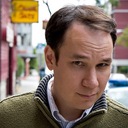
Jamie is a very down-to-earth guy with a great sense of humor and an engaging humbleness. He has done a ton of interviews specifically about his novel, but I thought it would be interesting to talk with him a bit more about his writing and how he got to be where he is today. I hope you enjoy our chat.
Where did you get the idea for Hotel on the Corner of Bitter and Sweet?
I remember sitting in a classroom at a writer’s conference in Virginia in 2006 and our workshop leader spoke about a “Noble Romantic Tragedy” and how he’d never been able to pull one off. I guess I took that as a challenge. But, I’m a sucker for a good love story. I’m wired that way—I cry at sad movies, while reading sad books, while watching sad Burger King commercials—I’m shameless.
Did your father actually wear an “I am Chinese” button?
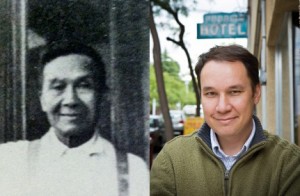 He did. Lots of Chinese kids did. Grown-ups too. He talked about walking to school and Caucasian kids throwing rocks and him and calling him a Jap. Because, you know, we all look alike. Ironically, his dad was an extra in Hollywood in the 50s and played Japanese soldiers, Japanese fighter pilots, and such. But that was back when Mickey Rooney could be cast as Mr. Yunioshi in Breakfast at Tiffany’s and no one batted a slanted eye. (Photo: Jamie with his grandfather Min Chung).
He did. Lots of Chinese kids did. Grown-ups too. He talked about walking to school and Caucasian kids throwing rocks and him and calling him a Jap. Because, you know, we all look alike. Ironically, his dad was an extra in Hollywood in the 50s and played Japanese soldiers, Japanese fighter pilots, and such. But that was back when Mickey Rooney could be cast as Mr. Yunioshi in Breakfast at Tiffany’s and no one batted a slanted eye. (Photo: Jamie with his grandfather Min Chung).
Do you know anyone personally who was interned?
I do. As a child, one of my best friends was half-Japanese. His father is Lawson Inada, who was interned in California and Arkansas, and later became Oregon’s Poet Laureate. Lawson was the first former internee to read an early draft of Hotel.
Tell us about your family background. How did you end up with the last name Ford?
My great-grandfather immigrated to the US from China around 1860 and later changed his name from Min Chung to William Ford, thus confusing countless generations. He became a labor foreman for the Borax Mining Company in Tonopah, Nevada. No one really knows the specifics of the name change. Was it better for him professionally? Or was it just an early form of identity theft? Who knows? It’s kind of like an immigrant coming to this country today from Pakistan and changing his name to Chuck Norris or Michael Jordan. It just sounds ostensibly American. “Writer’s block is your subconscious telling you that what you’re working on actually sucks.”
How long did it take you to write Hotel?
Having a bestseller is like dancing naked on Broadway. Part of you is happy to be on stage, but another part is wishing you’d spent more time in the gym—it can be embarrassing at times. In other words, if I had known so many people would be reading Hotel, I would have spent more time writing it. That being stated, the research was about six months of work, off and on. The actual writing took about three months.
You transformed a short story into Hotel. Did you always have a desire to write a novel?
I love short fiction, but the market for short fiction is almost theoretical these days. So I quickly jumped into novels. I actually wrote a novel before Hotel, which will never, ever, see the light of day. I shudder at the thought of authors like Nabokov or Crichton, whose lesser works have been published posthumously. They must be spinning in their graves or haunting some well-meaning, cash-poor relative. When I’m gone, I assure you, that first novel will be given a good Viking funeral. I thoroughly love writing fiction. When you’re in a groove it’s almost narcotic. I don’t want to come out of the story. It feels indulgent and immersive. It changes you.
What did you do for work before you became a writer?
I graduated from art school with a degree in design, and later worked as an art director and as a creative director in advertising. It’s a handy skill-set to have, because in advertising, you become a creature of deadlines and have work rejected on a daily basis. Plus, it’s one of those careers where really strange creative types can subsist—you get paid to use your imagination.
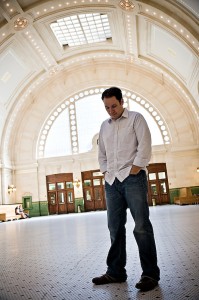
Do you enjoy writing or is it difficult for you at times?
I thoroughly love writing fiction. When you’re in a groove it’s almost narcotic. I don’t want to come out of the story. It feels indulgent and immersive. It changes you. Or as Ray Bradbury once said, “You must stay drunk on writing so reality cannot destroy you.” There’s something to that. The field of literature is littered with the bodies of brilliant writers who lost themselves along the way. I love the creative process, but as you’re speeding along, every once in a while you glimpse the off-ramp to Crazy Town. Treading near that place is part of the fun.
What do you think are the most important traits of a successful writer?
1) Voice. You can teach craft, but you can’t teach voice. Voice is learned through self-discovery and a lot of trial and error. It’s like baking a chocolate cake—you can assemble all of the ingredients in the proper proportions, but that voice is the heat. You can bake that mixture for hours until you have a chocolate-scented brick, or leave it as pudding. I think successful writers, regardless of genre, are writing in their true voice.
2) Experience. As Pat Conroy often says, “The greatest gift a writer can ever receive is an unhappy childhood.” Having a deep well of life experiences to draw from is invaluable. The Internet allows us to learn about everything, but experience nothing. Unplug. Go outside. Feel something.
3) Read. I’m always astonished when I find an aspiring writer that doesn’t actually read. (They usually watch a LOT of movies and somehow think that counts). I’ve never met a successful writer that isn’t also an intrepid reader.
Being a bestselling author doesn’t make the writing any easier… I still start with a blank page every morning.
A friend told me, “Writer’s block is your subconscious telling you that what you’re working on actually sucks.” I’ve found that to be painfully, painfully true. When I get writer’s block, it’s usually because deep down I know I’ve strayed from where the story needs to go. When that happens, I back up, revisit the taproot of the story, and find another path.
Many writers have a bit of insecurity about their abilities. Do you ever feel insecure and unsure, even now that you are successful?
All. The. Time. Being a bestselling author doesn’t make the writing any easier. It’s afforded me a nice office and a few creature comforts, but I still start with a blank page every morning. But those insecurities make the work challenging and worth doing.
Do you write every day? How many hours or words a day do you write?
I don’t write every day, because I do a lot of research. But when I am writing, I try to write every single day, from the morning to mid-afternoon then I edit what I just wrote. And edit again the next morning. I tend to work from scene to scene without worrying about word-count, but I’m guessing around 1,500 words would be a safe average.
Do you always write on a current project or do you ever write just for yourself, say, in a journal?
I wrote in journal for ten years, until I began blogging. Now social media occupies the time I would have spent journaling. Doesn’t seem like a fair trade, does it?
You wouldn’t sit down at the piano for the first time and try to play Mozart, would you? Start small. Write a short story with a single POV. Then kick the training wheels off when you’re ready.
The process of writing can be so isolated. How do you stay motivated?
I’m a bit of a workaholic, so motivation has never been a problem. But I do have a house full of teenagers, so the isolation is what I lack at times. Fortunately there’s the good ol’ public library where I often steal away to get writing done. It’s relatively quiet and no one bugs me for rides to the mall.
I know you’ve done a lot of travel and book events. How do you balance the requirements of being an author with family time?
The good thing is, I write at home. So when I’m not traveling I’m home in every sense of the word. I’m able to go to volleyball games and talent shows and all of the fun stuff. Plus my publicist and booking agent have the dates of my wife’s birthday, my kids’ birthdays, so I’m never even asked to go on the road during those times. I work around it. Even when I was on a six-week tour, I’d come home almost every weekend. And sometimes I’d just bring the whole family along. I had a week in DC, Virginia, and Maryland and we just brought the whole herd. We’d do tourist things by day and then I’d have book events in the evening. I’ll never forget giving a talk at the Smithsonian, in this exquisite gallery, and my teenagers were in the back thinking, “My dad is the most boring person on the planet.” It was lovely.
What advice do you have for writers who want to get published? Anything you learned along the way that might be helpful or encouraging? Tips, insights, suggestions on how to keep moving forward?
Allow a healthy margin for self-improvement. You wouldn’t sit down at the piano for the first time and try to play Mozart, would you? Of course not, you’d sit down and plink away and work your way up. But so many aspiring authors sit down at the keyboard and try to write their magnum opus—they try to write an epic seven-book series, with twenty point-of-view characters, and when it doesn’t turn out well they think, “I guess I’m not a writer.” It doesn’t work that way. Start small. Write a short story with a single POV. Then kick the training wheels off when you’re ready. The field of literature is littered with the bodies of brilliant writers who lost themselves along the way.
What’s next for Jamie Ford?
I’m currently finishing rewrite number 2,087 (it feels that way) of a new novel. It’s not a sequel to Hotel—more of a spiritual twin. It’s the story of a student conscripted into the Japanese military during WWII. It’s another historical, multi-cultural love story of sorts. Beyond that I’ve been collecting research materials for a third book, plotting out a Young Adult book, and playing around with a bunch of Hotel-related short stories. Oh, and I need to schedule in a nap. 2012 is looking good for that.
UPDATE: Since this interview, Jamie published his second novel, Songs of Willow Frost.
You can find Jamie’s website at www.jamieford.com, or connect with him on Twitter at twitter.com/#!/jamieford

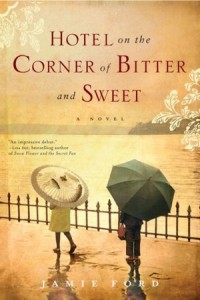
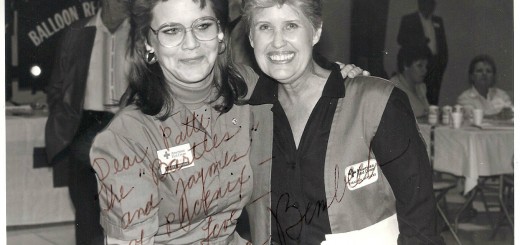
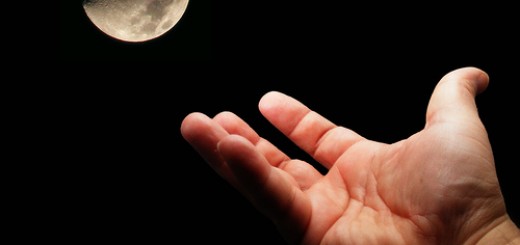
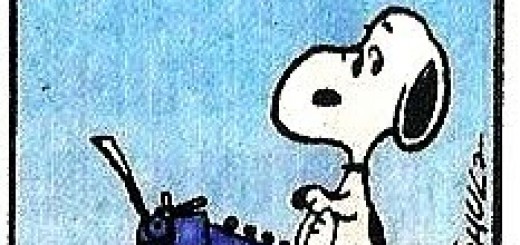



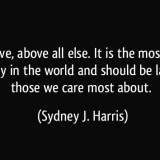
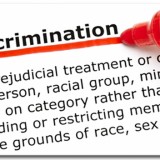


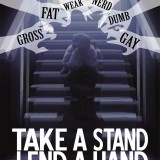
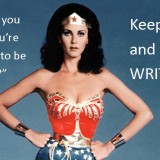

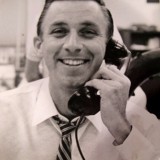
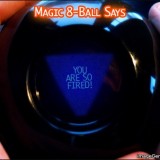
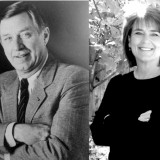

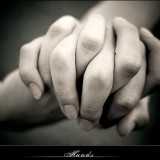
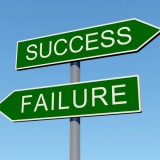


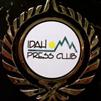
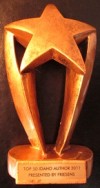
Love it!
Great interview, great questions. You are both super interesting people.
Hi Donna, thanks for visiting and for your comments! Hope to see you around again. ~ Patti